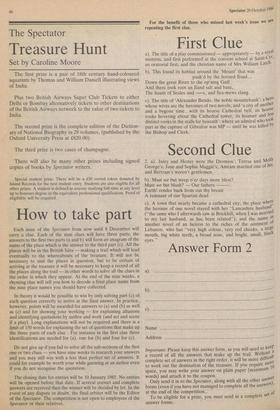The Spectator
Treasure Hunt
Set by Caroline Moore
The first prize is a pair of 18th century hand-coloured aquatints by Thomas and William Daniell illustrating views of India.
Plus two British Airways Super Club Tickets to either Delhi or Bombay alternatively tickets to other destinations of the British Airways network to the value of two tickets to India.
The second prize is the complete edition of the Diction- ary of National Biography in 29 volumes, (published by the Oxford University Press at £820.00).
The third prize is two cases of champagne.
There will also be many other prizes including signed copies of books by Spectator writers.
Special student prize: There will be a £50 record token donated by Island Records for the best student entry. Students are also eligible for all other prizes. A student is defined as anyone studying full-time at any level up to honours degree or the equivalent professional qualification. Proof of eligibility will be required.
How to take part
Each issue of the Spectator from now until 8 December will carry a clue. Each of the nine clues will have three parts; the answers to the first two parts (a and b) will form an anagram of the name of the place which is the answer to the third part (c). All the places will be in the British Isles — making a trail which will lead eventually to the whereabouts of the treasure. It will not be necessary to visit the places in question, but to be certain of arriving at the treasure it will be necessary to keep a record of all the places along the trail — in other words to solve all the clues in the order in which they appear. At the end of the nine weeks, a rhyming clue will tell you how to decode a final place name from the nine place names you should have collected.
In theory it would be possible to win by only solving part (c) of each question correctly to arrive at the final answer. In practice, however, points will be awarded for answers to (a) and (b) as well as (c) and for showing your working — for explaining allusions and identifying quotations by author and work (and act and scene if a play). Long explanations will not be required and there is a limit of 150 words for explaining the set of questions that make up the three parts of each clue . For instance in the first clue three identifications are needed for (a), one for (b) and four for (c).
Do not give up if you fail to solve all the sub-sections of the first one or two clues — you have nine weeks to research your answers and you may still win with a less than perfect set of answers. It could for example be worth your while guessing at an author even if you do not recognise the quotation.
The closing date for entries will be 10 January 1985. No entries will be opened before that date. If several correct and complete answers are received then the winner will be decided by lot. In the event of any dispute or doubt, the final arbiter will be the Editor of the Spectator. The competition is not open to employees of the Spectator or their relatives. For the benefit of those who missed last week's issue we are repeating the first clue.
First Clue
a). The title of a play commissioned — appropriately — by a royal mistress, 'and first performed at the convent school at Saint-Cyr, an oratorial first; and the christian name of Mrs William Latch.
b). This found its habitat around the 'Mount' that was push'd by the horned floud... Down the great River to the op'ning Gulf And there took root an Iland salt and bare, The haunt of Seales and —s, and Sea-mews clang.
c). The title of 'Alexander Bendo, the noble mountebank'; a hero whose wives are the heroines of two novels; and 'a city of another and a bygone time...with its hoarse Cathedral bell, its hoarse rooks hovering about the Cathedral tower, its hoarser and less distinct rooks in the stalls far beneath'; where an admiral who took part in the capture of Gibraltar was MP — until he was killed by the Bishop and Clerk.
Second Clue
2. a). Juley and Hester were the Dromios'; Teresa and M01.151 George's; Jane and Sophie Maggie's; Amram married one of Ills, and Bertram's weren't gentlemen.
b). Must we but weep o'er days more blest?
Must we but blush? — Our fathers Earth! render back from out thy breast A remnant of our Spartan dead.
c). A town that nearly became a cathedral city; the place whelT, the heroine of one novel stayed with her "Lancashire husband ("the same who I afterwards saw at Brickhill, when I was married to my last husband, as has been related"); and the name In, another novel of an heiress to the riches of the ointment of Lebanon, who has "very high colour, very red cheeks, a large mouth, big white teeth, a broad nose, and bright, small, black eyes."
Answer Form 2
''............................................................................ ''''''' ......................................................................................................................................................................................................................................................................................................................................................................................................................................................................
Address........... ..............................................................
Important: Please keep this answer form, as you will need to keep a record of all the answers that make up the trail. Without .8, complete set of answers in the right order, it will be more difficult to work out the destination of the treasure. If you require 1.11°rer, space, you may write your answer on plain paper (maximum lu words) and attach it to the coupon. Only send it in to the Spectator, along with all the other answer forms (even if you have not managed to complete all the answers), at the end of the competition.. of To be eligible for a prize, you must send in a complete set answer forms.


















































 Previous page
Previous page